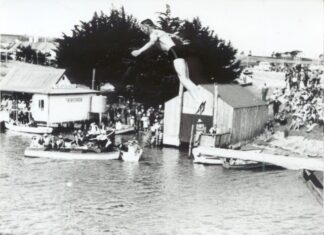BOYS and girls who join Scouts are not just better prepared than other children – new research shows they are better problem-solvers, more confident socially and have handled COVID-19 isolation well because they are more mentally resilient.
This was the lead paragraph in a Melbourne daily newspaper story last month and it sums up perfectly what Boy Scouts and Girl Guides, as they were called during previous generations, have done for many hundreds of thousands who were part of the scouting movement in their younger years.
I joined the Cubs at eight years of age and later moved into Scouts and Senior Scouts.
Scouting taught me many things, including how to use your initiative, discipline and how to take orders (that took a while) and how to lead, take control and give orders (that came easy) but most importantly, it taught life-skills and how to survive during times of crisis.
There were plenty of times, mainly in Senior Scouts when we were “dumped” out in the bush with little more than a two-man tent, sleeping bag, a water bottle, a few matches, limited food supplies, a compass and told to survive for the weekend and make it to a certain point by a certain time in the next two days.
Then you had to produce a map highlighting your route, using compass bearings and exact distances travelled.
It brought the best out of you and when you arrived at the destination you knew you had achieved something special but not only that, the bonding which existed with your scouting partner for the journey (who was Darryl “Sid” Hosking) became something which lasted a lifetime.
No-one could take that away from you.
The same applied when we had to trek two days through the GawlerAdelaide gorge to complete our proficiency badge to qualify to be a Queen’s Scout.
Using one’s initiative does not seem like much but it was often used by scout masters to push you into situations where you had to make decisions under pressure to allow you to complete assignments.
In the early 1960s I was Patrol Leader at a long weekend camp in the bush between Dingley Dell and Clarke’s Park and each patrol competed in various challenges for points.
By Monday morning my patrol was a clear leader but the final assignment would be worth double points, meaning the second placed patrol could take out the “Camp Champ” title if it won.
Scouts were taken to the Woolwash at Port MacDonnell and told to make their way back to the camp site, a distance of about 10km, any way they chose.
It was even suggested they could “borrow” a bike if they so desired.
The first person home would win the challenge.
I used my initiative and took a huge gamble.
Assistant scout master Les Burcezky had a Volkswagen and with scout master Colin Bodey they planned to drive back to the camp and await the first arrival.
The car was parked nearby and as other scouts headed off I slid into the VW and hid on the floor between the back and front seats and pulled a blanket over me.
The two scout masters had no idea I was lying in the back and when they arrived I jumped out and claimed victory.
At first I did not really expect to pull it off, but with initiative and a little luck it worked.
Scouts also taught me life skills in how to cook, wash, iron and be self-sufficient which proved more than handy much later when bringing up my son after gaining primary custody.
Those life skills proved a life-saver and with him living with me during school week days, together we had a lot of fun preparing meals and doing household chores.
It is difficult making household chores “fun” for an eight-year-old but the good thing was he learnt those skills so he could use them in later life.
The great pity today is that scouting is not seen as popular as it once was and many of today’s younger generation parents show little desire in encouraging their children to take it up.
One of the things highlighted in the published research on scouting was that in almost all cases, scouting provided self-confidence and the emotional capacity to help cope during difficult times.
Significantly, the research said that those in scouting were more likely to have a healthier mental state – 62pc versus 49pc for other children and they also held out more hope for a positive future – 79pc compared with 69pc for non-Scouts.
It also stated that on every measure, children participating in scout activities performed better than their peers.
Those in Scouts were also more likely to give their time to help others in society, trusted others more and get this – 76pc versus 69pc were likely to enjoy school more (that did not apply to me!) And Scouts were more likely to know they could solve a problem when others wanted to quit.
Yep, I agree with all that because I have seen it all my life and I know what Scouting gave me and still gives today.
“Be Prepared” is the Scout’s motto and by being prepared, so many of today’s problems are more easily solved.







